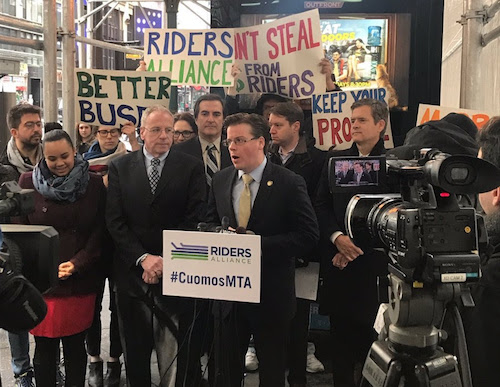Assemblymember Robert “Bobby” Carroll (D-Park Slope, Windsor Terrace, Kensington) yesterday, a lifelong straphanger who does not own a car, announced yesterday his six-step solution to overhaul and improve the MTA.
Dubbed “The Carroll Plan,” Carroll proposes among other things, canceling Mayor Bill de Blasio’s $2.5 billion plan to build a trolly along the Brooklyn and Queens East River waterfront and dubbed the BQX.
“The BQX is a creative idea, but it’s a $2.5 billion dollar diversion from the real transit crisis in this city.” Carroll said “All current and future funds dedicated to the BQX should be redirected to the MTA Capital budget.”

Another step that Carroll is floating is to divert a small percentage of state personal income tax from counties served by the MTA towards the MTA’s capital expenses. Unlike the commuter tax, which levied a small tax on commuters outside the city, this tax would charge everyone that utilizes the MTA in the New York City Metropolitan area.
Carroll announced the plan after giving the matter much thought and deciding it was up to elected officials to show political leadership in making some difficult decisions.
“New Yorkers are uncomfortable on their commutes, crammed into trains and sitting for long periods in decrepit stations on hot platforms,” said Carroll. “And we, as leaders, must make some uncomfortable choices about how to improve their lives.”
Carroll noted that the current transportation crisis has a wide impact on the lives of New Yorkers in that it drains money from their pockets in taxes and fares and lost productivity. It degrades their quality of life by taking them away from their friends and family for needlessly long hours. And it impacts their health; studies show that people with long commutes may live shorter lives, said Carroll.
“We have been forced to accept that a bad commute is simply part of living in New York City,” Carroll said. “That does not have to be the case. But we need commitment, sacrifice, and a real plan. The MTA’s capital budget is underfunded. We have to find places to add money for newer trains, modern stations, and efficient equipment. The money is there. And I know where to look.”
The other steps in Carroll’s plan includes:
- Call a special session. “I ask the governor to call a special legislative session so we can find a congestion pricing plan that works,” Carroll said. “We need to fund the MTA without crushing outer borough drivers who have little choice but to drive to Manhattan. I propose lowering outer borough bridge tolls on bridges such as the Verrazano, Whitestone, and Throgs Neck. We can make up the revenue by tolling the East River bridges. And I want tolling discounts for commuters who live in transportation deserts, who have few MTA options.”
- Float a bond. “The Legislature should pass and the voters of the state of New York should approve a general obligation bond to be floated by the State of New York for $4.5 billion dollars so that the state can infuse the MTA Capital Budget with much-needed funds to modernize signals and switches and purchase modern open gangway subway cars.”
- Increase the taxi surcharge. “Currently, the state levies a 50 cent MTA surcharge on each yellow and green taxi ride,” said Carroll. “I propose we increase this to one dollar and that we apply this surcharge to black cars, Uber and other ride sharing applications. This would bring in between $225 million – $300 million dollars in funding for the MTA.”
- Call an efficiency task force. “For some reason, the MTA is the most expensive transit system on Earth. For example, the MTA paid $1.7 billion per kilometer for the 2nd Avenue subway while recent additions to the London tube cost $450 million per kilometer and the Paris Metro came in at $230 million per kilometer. London and Paris are old densely populated cities that have high labor costs like New York and yet they are able to make additions and improvements to their mass transit systems at a fraction of our cost. The governor must form a task force to find out why it costs so much to operate,” said Carroll. “And root out waste and inefficiencies.”










